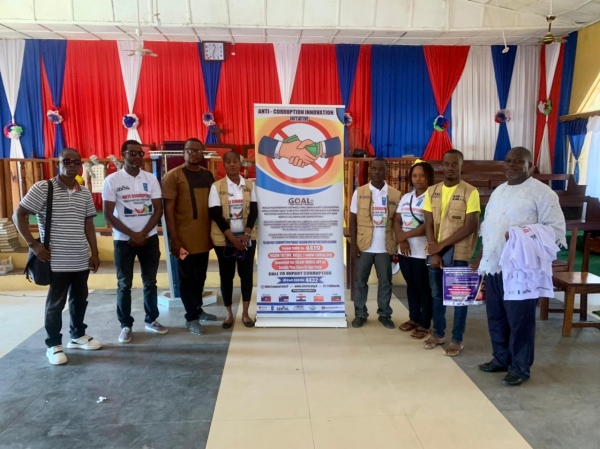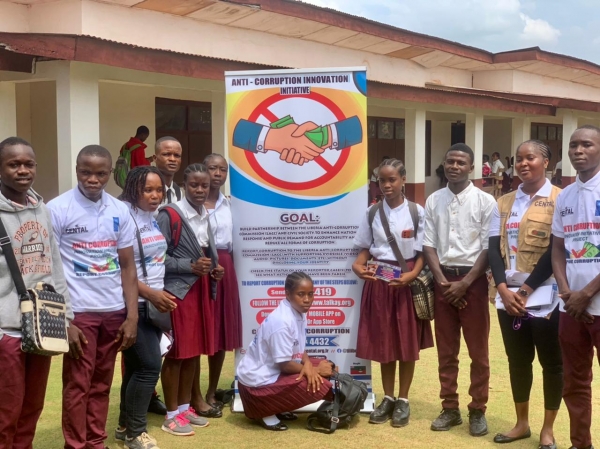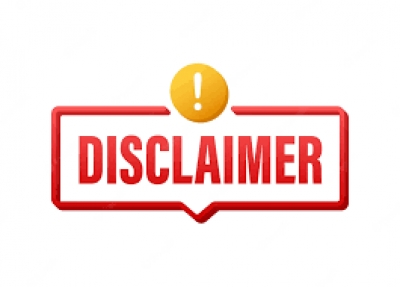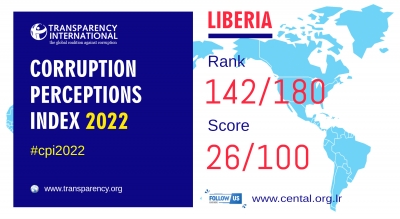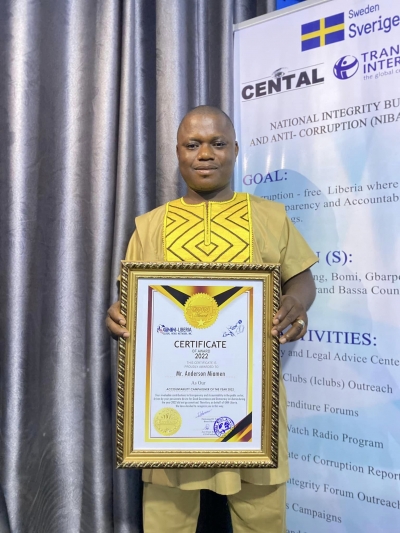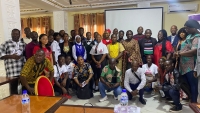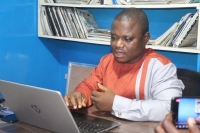
News (108)
CENTAL Takes TALKAY Awareness Campaign to Nimba County
Written by EditorMonrovia, February 23, 2023 – Corruption takes many forms. Increasing citizens’ awareness and reportage about the act and other forms of corruption through an innovative approach has been at the core of outreach activities of CENTAL in Nimba County. CENTAL in partnership with the Liberia Anti-Corruption Commission (LACC), Integrity Watch Liberia and the Accountability Lab Liberia with support from the Swedish International Development Cooperation Agency (SIDA) through the United Nations Development Program (UNDP), is conducting awareness around a corruption reporting innovation in Bong, Nimba, Grand Bassa, Bomi, Gbarpolu, and Montserrado counties.
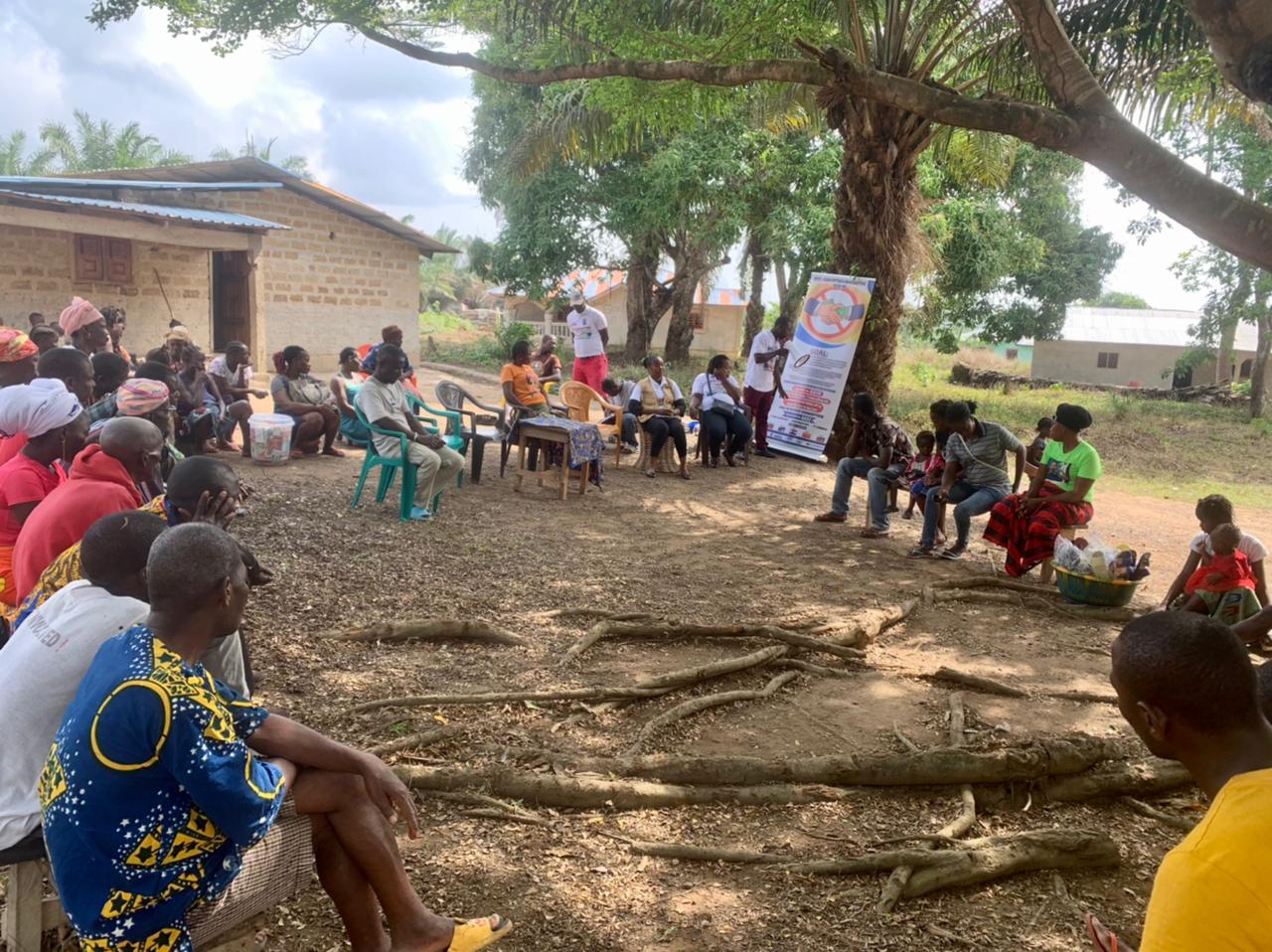
The effort places whistleblowers in direct and secure contact with the LACC through the TALKAY platform. Those using the mobile app and website to file complaints would be able to send reports and attach multiple files (video, audio, document etc.) with an option to remain anonymous or not. Once sent, an automatic generated reference number that can be used to follow up on the report. All reports submitted using either the web app, mobile app or SMS go to large screens dashboards at the Liberia Anti-Corruption Commission (LACC) in real-time. The LACC then investigates the report and takes appropriate action. Once actions are taken, the system updates based on the action taken and those filling reports can track the status of their report using their unique ID numbers issued when they submitted their reports.
“We the disabled people in Nimba County have been longing for our voice to report corruption because we have been afraid of what might happen to us after we have reported”, said Nenlay G. Doe, Chair for the Nimba Disabled Community. “But with the assurance of guaranteed protection and confidentiality”, she continued “we will now begin to report acts of corruption as we see it without fear. We are happy that we now have a platform to report about things that affect us as a people-all thanks to CENTAL and her partners for this initiative”, said Madam Doe.
Several marketers who converged at the Liberia Marketing Association office in Sanniquellie City, first expressed their individual opinions about corruption and then quizzed the outreach team on benefits of the innovative approach. “Although, we are all happy that we now have a platform to report corruption, we must only report only what we hear and see but not lies”, Winifred Guah, head of the Liberia Marketing Association Nimba Chapter, cautioned her fellow marketers.
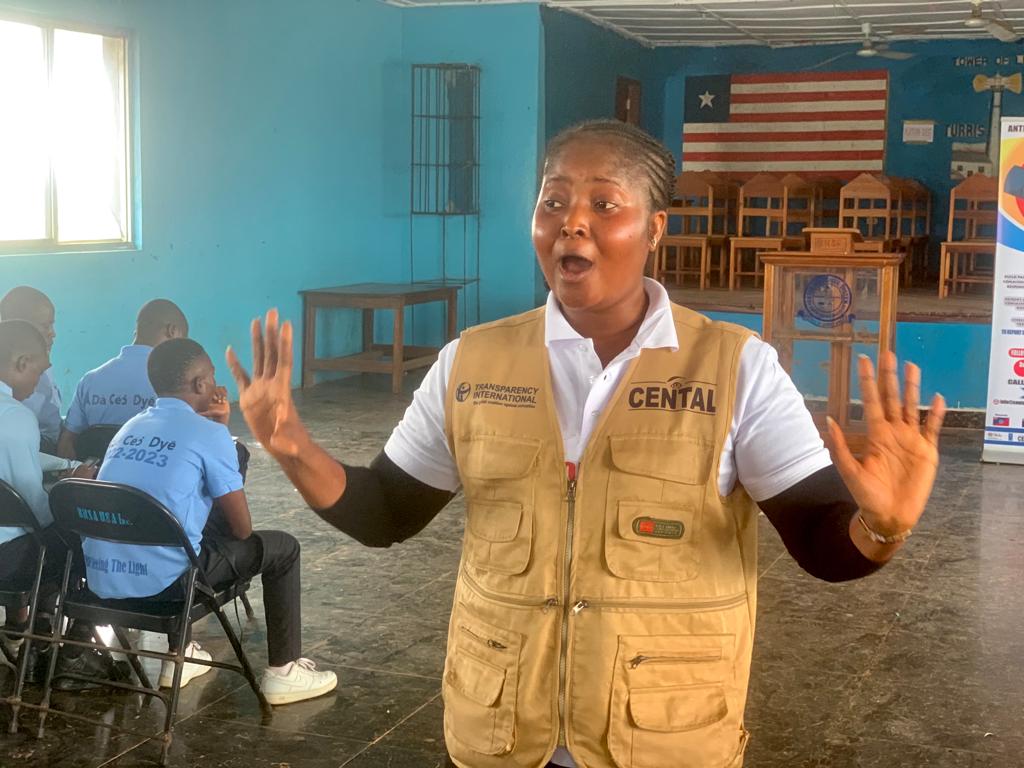
Jerryline Wonde, CENTAL’s Coordinator for Integrity Clubs, espoused the need to elect leaders who would make policies that ensure equal access to basic social services for everyone including people with disabilities. But this, she said can only be achieved when everyone joins together to fight corruption.
Using Technology to Fight Corruption: CENTAL Begins Outreach on Corruption Reporting Mobile App
Written by Editor“Corruption only benefits few and robs the larger population of what they deserve like basic social services”, Peter N. Dolo says. Dolo is Executive Director of Community Solutions Aid, a local advocacy group in Bong County, Central Liberia. If Dolo’s statement is anything to go by, then the poverty and lack of basic services in the country can rightly be linked to the menace of corruption.
In Liberia, allegations of corruption are rife. In the 2022 State of Corruption Report released by CENTAL, 90 percent of those surveyed indicated that the level of corruption in Liberia is high. Liberia has also reached its all-time low on the Corruption Perceptions Index of Transparency International, scoring 26 out of 100. But despite these alarming statistics, whistleblowing, which remains an important tool in preventing and detecting corruption and other malpractices, has been discouraged by inadequate protection for whistleblowers, amongst others.
The government of Liberia through the Liberia Anti-Corruption Commission (LACC), with support from the Swedish International Development Cooperation Agency (SIDA) through the United Nations Development Program (UNDP), has partnered with the Center for Transparency and Accountability in Liberia CENTAL, Integrity Watch Liberia and the Accountability Lab Liberia to deliver a corruption reporting tool and ramp up awareness around the tool in Bong, Nimba, Grand Bassa, Margibi, Gbarpolu and Montserrado counties on implementation of an Anti-Corruption Innovation Initiative. Under the initiative, a mobile application called ‘TALKAY’ has been developed to provide citizens the platform to report corruption allegations anywhere in Liberia without disclosing their identities. This effort places whistleblowers in direct and secure contact with the LACC. Those using the mobile app and website to file complaints would be able to send reports and attach multiple files (video, audio, document etc.) with an option to remain anonymous or not. Once sent, an automatic generated reference number that can be used to follow up on the report will be received. All reports submitted using either the web app, mobile app or SMS go to large screens dashboards at the Liberia Anti-Corruption Commission (LACC) in real-time. The LACC then investigates the report and takes appropriate action. Once actions are taken, the system updates based on the action taken and those filling reports can track the status of their report using their unique ID numbers issued when they submitted their reports.
In Bong, CENTAL has kicked-off awareness activities around TALKAY with Nimba, Grand Bassa, Montserrado, and Bomi to follow. Like many other counties, Bong County is suffering the effects of corruption. Already, the county is feeling the pinch from the menace. The County’s account, which holds the county development funds has had a moratorium placed by the national legislature over allegations of mismanagement of previous funds. This has in a way, hamstrung the provision of some basic social services for the people. “Through this initiative, we are hoping to turn the history of this country around to one that uses its resources and taxes to develop the country”, said, Madam Bendu Kpoto, Legal Officer at CENTAL, during an engagement session with students of the Dolokelen Gboveh High School.
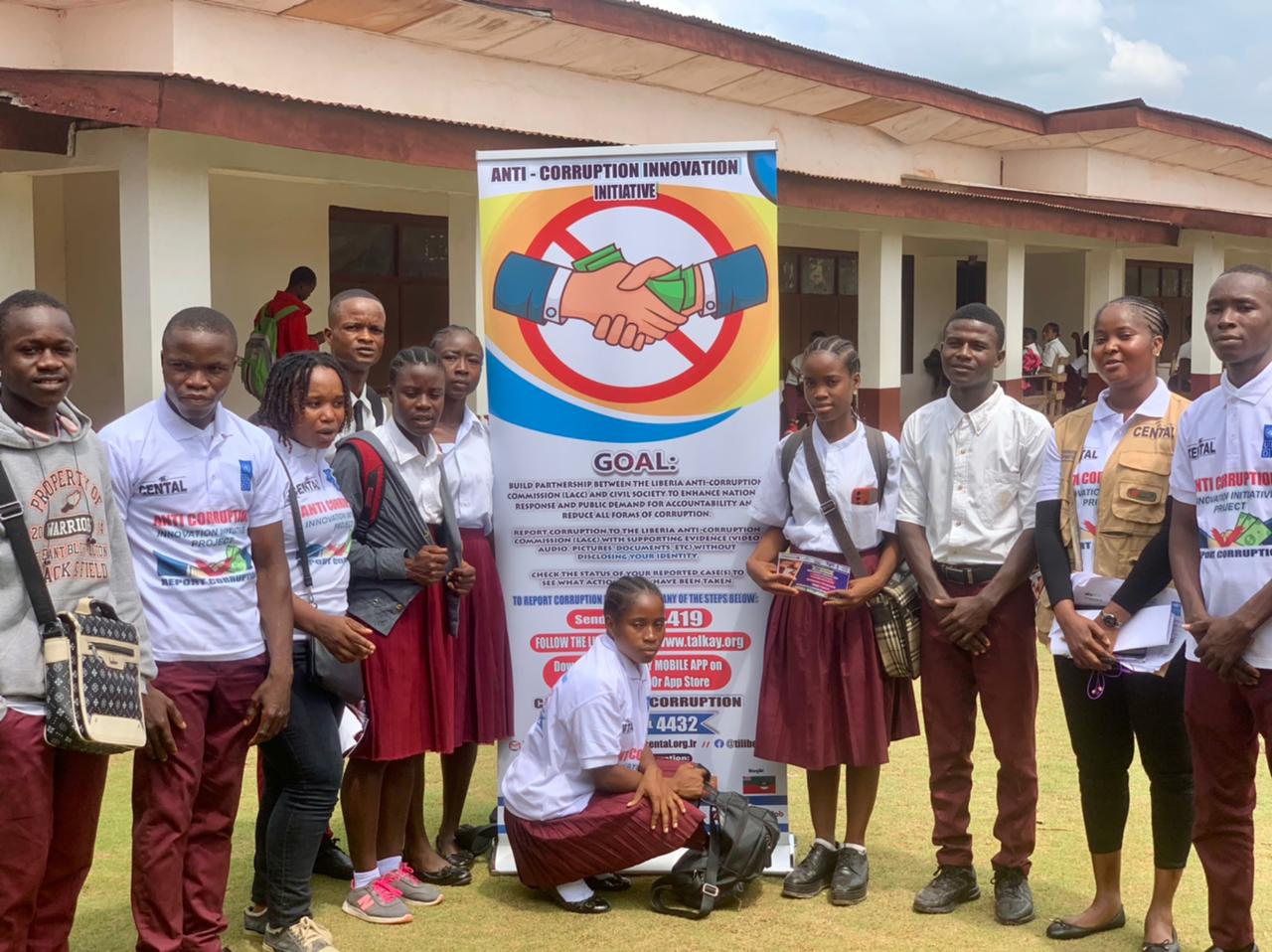
Madam Kpoto rallied the students to utilize the mobile app, the 4419 SMS service, 4432 call-in service to report any act of corruption. This, she said, will allow for the delivery of basic services like health, education, and infrastructure development. Arthur Bono, Bong County Chapter Chairman for the National Union for the Disabled pledged to make use of the application and other services to report corruption issues because of the current effects it is having on members of his organization.
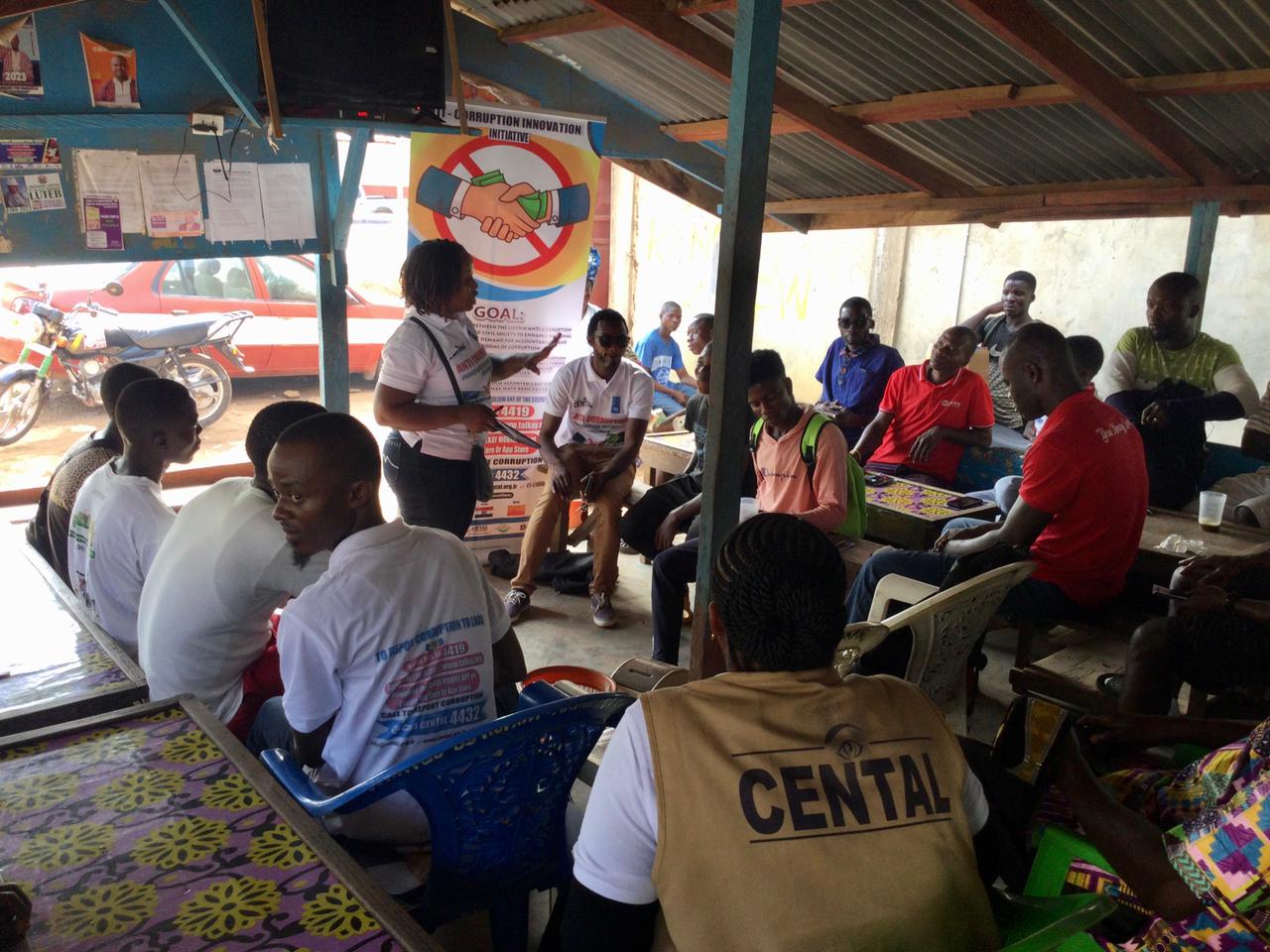
Also, members of the Bong Athletic Social Intellectual Center, an intellectual forum promised to use the app and other platforms to flag corruption issues. Because of the significance of this initiative in the fight against corruption, Peter Dolo, recommended that government of Liberia and its partners increase education about innovation, increase protection for whistleblowers, and ensure speedy prosecution of corruption cases.
On Thursday, 9 February 2023, a video circulated on social media in which a young Liberian is seen pulling down publicity materials of government officials and politicians at the Capitol Building, the official seat of the Liberian Legislature. The young man is also seen wearing a t-shirt marked by the logos of CENTAL and Transparency International as well as the flag of Sweden, which funds our work through Sida. While CENTAL rallies citizens to take actions against corruption as well as promotes active citizen-participation in the democratic process, we wish to clarify that the action of the young Liberian was not carried out under the auspices of CENTAL. Further, he is not an employee of CENTAL and did not receive any instruction from CENTAL regarding his actions at the Capitol.
Signed: Management
Press Statement for Immediate Release
Rising Public Sector Corruption in Liberia, as President Weah Presides Over Liberia’s Worst Ever Score/Rating on the CPI
Monrovia, Tuesday, 31 January 2023
The Center for Transparency and Accountability in Liberia (CENTAL) is pleased to release the findings of Transparency International’s Corruption Perception Index (CPI) 2022. Since 1995, the Corruption Perception Index has been scoring and ranking countries based on how corrupt their public sectors are perceived, according to experts and business executives. The score ranges from 0 (highly corrupt) to 100 (very clean), where 0 equals the highest level of perceived public sector corruption and 100 equals the lowest level of perceived public sector corruption. 180 Countries were targeted in 2022 as in 2020 and 2021.
The CPI draws upon 13 data sources, which captured the assessment of experts and business executives on a number of corrupt behaviors in the public sector. These corrupt practices and behaviors include bribery, diversion of public funds and supplies, use of public office for private gain, procurement irregularities, state capture, and nepotism in the civil service. Also, some of the assess mechanisms available to prevent and address corruption in a country. Examples include the government’s ability to enforce integrity mechanisms; independence of anti-graft institutions; the effective prosecution of corrupt officials; conflict of interest prevention; access to information; freedom of speech and the media, and legal protection for whistleblowers, witnesses, journalists, and investigators.
Global Highlights:
The CPI 2022, released today by Transparency International mainly focuses on the link between Corruption and Insecurity/Conflict. CPI 2022 shows that most of the world continues to fail to fight corruption: 95 per cent of countries have made little to no progress since 2017. In other words, the fight against corruption has stagnated worldwide at a time when conflict and insecurity abound and human rights and democracy are also under attack. This is no coincidence. Corruption enables human rights abuses and fuels conflict and insecurity. Equally, ensuring peace and security and basic rights and freedoms means there is less space for corruption to go unpunished.
The global average remains unchanged at a score of 43 out of 100 for the eleventh year in a row. Denmark (90) tops the index this year, with Finland and New Zealand following closely, both at 87. Strong democratic institutions and regard for human rights also make these countries some of the most peaceful in the world, according to the Global Peace Index. Meanwhile, South Sudan (13), Syria (13) and Somalia (12), all of which
are embroiled in protracted conflict, and remain at the bottom of the CPI. 26 countries – among them, Qatar (58), Guatemala (24), Liberia (26) and the United Kingdom (73) – are all at historic lows this year.
The highest-scoring region is Western Europe with an average score of 60. The lowest-scoring region is Sub-Saharan Africa (32). The 32 average score of Sub-Saharan Africa shows a bleak picture of inaction against corruption in the region, as governments are doing very little to deal with the culture of impunity.
Regional Highlights and Trends:
In 2022, the Corruption Perception Index shows a decade of stagnating Corruption levels amid insecurity, human rights abuses and democratic decline in Sub-Saharan Africa. Progress is stalled, while over 90 per cent (45 of the 49 countries surveyed on the continent) score below 50. The Sub-Saharan Africa average is 32, the lowest in the world. In the last decade, 43 countries in the region have either declined or made no significant progress. Since 2012, Botswana (55), Liberia (26), Mali (29) and South Sudan (11) have significantly declined on the CPI.
With a score of 70, the Seychelles earns the highest mark in the region, followed by Botswana (60) and Cape Verde (60) as distant second-place holders. Burundi (17), Equatorial Guinea (17), South Sudan (13), and Somalia (12) are the region’s worst performers. Some significant improvers over the last few years include Seychelles (70), Senegal (43), Ethiopia (38), Tanzania (38), Kenya (32), Côte d'Ivoire (36) and Angola (29).
Although no country is free of corruption, countries topping the CPI share characteristics of open government, press freedom, strong parliament/legislature, civil liberties, and independent judiciary. Meanwhile, countries at the bottom are characterized by widespread impunity for corruption; poor governance; and weak institutions, including but not limited to parliament/legislature and anti-corruption and integrity institutions.
Liberia’s Score and Performance:
From 29 in 2021, Liberia has dropped by 3 points to 26 in 2022. This further cements the country’s position as one of the biggest decliners on the CPI, dropping by a massive 15 points from 41 in 2012 to 26 in 2022. The country now ranks 142/180 and remains further down the table, joining the list of countries significantly declining on the CPI. Worldwide, with the exception of Saint Lucia that has dropped sixteen (16) points, only Liberia has fallen fifteen (15) points since 2012. Also, in West Africa and the Mano River Union, Liberia is the only country that has declined by 6 points over the last five years. Since the country attained her highest score of 41 in 2012, it has been in free-fall on the CPI, topping the list of countries with stagnated and declining anti-corruption efforts, much to the disappointment of many. This is corroborated by CENTAL 2022
State of Corruption Report (SCORE 2022), which reveals that 90% of Liberians think Corruption level is high in the country, with confidence in the executive branch of government to fight against corruption declining from 30% in 2021 to 26% in 2022.
CENTAL is extremely concerned over Liberia’s continuous poor performance, especially her place among the Worst Decliners globally. In part, this speaks to the Liberian Government’s inability to address the entrenched culture of impunity by adequately funding public integrity institutions, fully enforcing existing anti-corruption laws and policies, and taking drastic actions against hi officials accused and investigated for corruption. Importantly, this year’s poor result should serve as a wake-up call to the President that his efforts are not good enough, as they have only taken the country backward in its anti-corruption drive. Liberians have heard more words and promises from the President and other public officials than genuine efforts in the fight against Corruption in the country. This has to change if the country’s extremely disappointing performance has to be reversed. Massive improvement in score and performance, and not stagnation and further decline, is what the country needs, going forward.
Recommendations:
Improvement is possible, but only when the necessary corrective measures are instituted. Like other countries that registered remarkable progress and improvements over the last decade, Liberia can climb the CPI ladder, surpass its 41 scores of 2012, and outperform other countries. However, this can be achieved if President is Sincere about his desire to tackle the entrenched culture of corruption, especially in the public sector.
We recommend the following additional actions/measures:
- That President George Weah leads by example and pursues a sincere and holistic fight against Corruption that does not protect certain individuals and groups accused and investigated for corruption, especially his confidantes.
- Public Officials accused and investigated for corruption should be prosecuted and made to face the full weight of the law. Strong administrative actions from the President are also needed to deter corrupt behaviors in and out of government.
- Government anti-corruption agencies must be fully funded and given adequate moral support. The independence and sanctity of integrity institutions should also be maintained by the President and his government.
- That issues bordering on governance and accountability take center stage in the Weah-led administration to give citizens and development partners confidence in his anti-corruption efforts and hope for a better Liberia.
- That the Legislature be robust and independent in playing its role, ensuring that priority is given to anti-corruption and governance issues.
- The Legislature should open itself up for a financial audit, as one of the single biggest receivers of taxpayers’ monies in Liberia.
- Finally, civil society, media, ordinary citizens, and other actors should remain active and constructively engaged in national efforts against corruption.
Signed:
Anderson Miamen,
0886818855/0776391481
CENTAL wins "Accountability Campaigner of the Year" Accolade
Written by Editor‘Natural Resources Must Work For Citizens’, CENTAL says regarding Western Cluster Mining Operation in Bomi County
Written by Editor‘Natural Resources Must Work for Citizens’, CENTAL says regarding Western Cluster Mining Operation in Bomi County
Monrovia, Friday, January 13, 2023 – Distinguished Ladies and Gentlemen of the Press, development partners and fellow Liberians:
Firstly, we extend our sincere best wishes for the New Year and appreciate you for standing with CENTAL and supporting our work in 2022. We look forward to more of your support and dedication to the fight against corruption in 2023. Meanwhile, the year has already begun with troubling developments that rehash nearly a century-long history of bad concessions in Liberia. What is even more troubling is that Bomi, one of the counties that have experienced natural resource extraction with virtually nothing to show, is again being placed at the epicenter of the resource paradox.
Fellow Liberians, CENTAL’s attention has been drawn to negotiations around the Western Cluster Concession in Bomi County, which has understandably generated tension between citizens of Bomi County and their leaders on the one hand, and Bomi County and the company itself (Western Cluster Limited) on the other hand. With utter shock, we have observed violation of fundamental constitutional safeguards such as the separation of powers. In particular, the involvement of Senator Edwin M. Snowe and the Bomi Legislative Caucus in negotiating a Memorandum of Understanding (MOU) establishes a serious conflict of interest on the part of Legislators who have an even higher responsibility of oversight regarding matters such as concessions. Further, the MOU undermines the 2011 Mineral Development Agreement (MDA) between the Republic of Liberia and Western Cluster Liberia Limited as it evades lawful taxes in millions of dollars owed by Western Cluster to the Government of Liberia, and approves potential environmental hazards posed by Western Cluster operations via trucking of minerals from Bomi through the Freeport of Monrovia.
Ladies and Gentlemen of the Press and fellow Liberians, the lack of citizens’ involvement in the said negotiations are even more telling and constitute flagrant violation of relevant laws, including the Land Rights Act of 2018. CENTAL continues to note these unorthodox incidents of corruption in the extractive sector involving some former and sitting lawmakers and ministers with utter dissatisfaction. This is and has always been the trend in Liberia, whereby government enters into agreements with companies to extract natural resources, usually at the disadvantage of citizens and affected communities. These acts do not only signal corruption, but also undermine transparent revenue generation by multinational firms through corporate lobbying to weaken enforcement of key mineral policies. Also, they influence policymakers’ decisions to win government contracts in mining companies’ favor through fraudulent means, thereby hindering efforts to garner needed revenues and transform the lives of affected communities/counties and Liberians, more broadly. As a result, Liberia continues to lose millions of dollars through shady concession deals and illicit financial flows in the sector. Unfortunately, these funds mainly benefit corrupt government officials and their allies instead of the government itself, thereby creating unnecessary financial burdens for government. The State is then compelled to beg for financial assistance and acquire loans for development purposes, when there is huge potential to generate internal revenues from natural resource extraction if corruption is prevented.
In 2019, it can be recalled that several former public officials were accused by Global Witness and subsequently indicted for soliciting US $950, 000 in bribes from UK-based Sable Mining Company. The aim was to change section of the Public Procurement and Concessions Commission (PPCC) Act in favor of the company to award Wologizi Mountain in Lofa without competitive bidding process. The likes of Grand Cape Mount County Senator Varney Sherman, Alex Tyler, former Speaker, House of Representative, Morris Saytumah, former Minister of State and now Bomi County Senator, Richard Tolbert, former National Investment Commission head and others were involved in the said corruption saga. What is even more disturbing is that some of the same names have resurfaced in this shady MOU arrangement wherein Bomi County Senator Edwin Snow mentioned Alex Tyler, former Speaker, House of Representative, Morris Saytumah, former Minister of State now Senator, and others as participants. This speaks to the fact that the culture of impunity continues to thrive as a result of a weak and compromised legal system that undermines the rule of law, democratic tenets as well as effective functioning of our judicial institutions established to reprimand violators of crimes.
Fellow Liberians, CENTAL is extremely elated that the people of Bomi are standing up and demanding accountability of their leaders and better treatment from a company operating in their county. This is exactly what we have pushing for over the years, working with communities in Bomi and other counties to educate them on their rights and roles in ensuring that their natural endowments work for them, in keeping with the Principles of Free, Prior and informed consent which seeks to promote transparency, accountability, and inclusion of all stakeholders involved in concession related activities and processes. We call on the citizens and people of Bomi County to remain steadfast in their advocacy for a better deal that reflects and truly seeks their interest, moving away from business as usual. Moreover, we call on the leadership of Bomi County, through its Legislative Caucus to respect the rights and plights of the people of Bomi in their call for nullification of a bogus MOU and demand for better treatment, including jobs and environmental protection.
Given the gravity of this situation and other longstanding issues of corruption in the extractive sector, we are calling on President George Weah to protect the Constitution and the Liberian People in this Western Cluster deal by demonstrating zero tolerance for corruption and bad governance. Circumstances surrounding development and implementation of the “bad MOU” should be investigated and those found wanting prosecuted for their actions. Also, any discussion (s) around review of existing concessions and awarding of new ones should be done in line with relevant Liberian Laws, the Extractive Industries Transparency Initiative guidelines and requirements as well as other international frameworks promoting inclusion, transparency, accountability, and full citizens’ engagement and meaningful participation in mining and other award decisions. Finally, the government of Liberia should also act to respect the principle of separation of powers, as provided for in the constitution of Liberia. Senators and Representatives who should be providing oversight and approving Agreements cannot at the same time be negotiators of said contracts.
Thank you.
Signed:
Management
So much achieved, much more expected As world unites against corruption and bad governance
Written by EditorThe International Anti-Corruption Conference (IACC) 2022 has come and gone. Working with other players, Transparency International collaborated with the U.S Government and successfully hosted the 20th edition of the conference.
Held from December 6-10 in Washington D.C, the United States of America, more than 2,000 in-person and 1,000 online participants representing government, civil society, media, private sector, international organizations, and other actors from 126 countries gathered for the event.
With funding from USAID, the executive director of the Center for Transparency and Accountability in Liberia (CENTAL), Anderson D. Miamen was at the conference representing the organization, civil society, and Liberia, more broadly.
In the organizers' words, “the IACC advances the anti-corruption agenda by raising awareness and stimulating debate. It fosters networking, cross-fertilization, and the global exchange of experience that are indispensable for effective advocacy and action, on a worldwide and national level.
The conferences also promote international cooperation among government, civil society, the private sector, and citizens by providing the opportunity for face-to-face dialogue and direct liaison between representatives from agencies, and organizations taking part.”
Held under the theme: “uprooting corruption, defending democratic values”, the week-long gathering featured over 70 sessions/workshops covering topics such as global security, climate change, beneficial ownership transparency, gender and corruption, youth integrity building, and media role in the fight against corruption. others include illicit financial flows and money laundering, government accountability, and the use of multi-lateral targeted sanctions to fight against corruption, etc.
Stakeholders from all walks of life deliberated on these and other topics with the objective of learning, sharing, and identifying strategic and innovative ways to address various forms of corruption (bribery, sextortion, fraud, state capture, bid rigging, etc.) and make it difficult for the corrupt and their accomplices to go with impunity.
True to its objectives, the 2022 conference facilitated networking, information exchange, learning, and coordination between and among global, continental, sub-regional, and national stakeholders (individuals, groups, networks, and institutions) leading and supporting the fight against corruption.
Participants exchanged pleasantries; made and listened to great speeches; shared their own challenges, successes, and lessons learned in fighting corruption at their levels; and became more capacitated and energized to continue the fight.
Additionally, the conference emphasized and even showcased what the world is capable of achieving if there is stronger and sustained collaboration and partnership between and among governments, the private sector, civil society, communities, and other stakeholders in making corruption and bad governance issues of the past.
For example, Transparency International and her chapters showcased how collaborative efforts with stakeholders are influencing major decisions and efforts in the governance and anti-corruption space and empowering citizens and communities to denounce corruption and demand accountability from their governments.
The conference has since ended. However, its core outcome (Washington Declaration) remains and will continue to be a reference document and tool for efforts to uproot corruption and defend democratic values worldwide, especially in Liberia.
The Declaration represents the consensus reached by participants, mostly anti-corruption fighters and campaigners to collaborate, innovate, remain committed, and take stronger actions against corruption, especially in their respective countries.
Having fully participated in the conference, more than ever before, CENTAL is determined and firmly committed to continuing pushing for a corruption-free Liberia where the lives of ordinary citizens will be improved and public service will be about public and not private/individual interest.
The organization is steadfast in her quest to strengthen alliances to defend key democratic values in Liberia; support citizens and communities to denounce corruption and report corrupt practices wherever and whenever they see it; advocate for full implementation of anti-corruption laws and policies; and push for ending the culture of impunity in Liberia.
CENTAL Welcomes President Weah’s Dismissal Action, Demands More Actions to Ensure Credibility and Integrity of LISGIS and the 2022 CENSUS
Written by EditorFOR IMMEDIATE RELEASE
Monrovia, Wednesday, November 16, 2022
CENTAL Welcomes President Weah’s Dismissal Action, Demands More Actions to Ensure Credibility and Integrity of LISGIS and the 2022 CENSUS
Distinguished ladies and gentlemen of the Press, Fellow Liberians and Development Partners. Thank you for being a critical partner to the Center for Transparency and Accountability in Liberia (CENTAL) and other civil society organizations in Liberia. We value our partnership and look forward to sustaining and strengthening the same for the betterment of Liberia.
Members of the fourth estate, for several months, the Liberia Institute for Statistics and Geo-Information Services (LISGIS) has been at the center of controversies, claims and counterclaims, and multiple allegations of corruption and financial malpractices. Of course, these developments have not augured well for the reputation of LISGIS, an institution that should be seen and known for credibility and integrity in collecting, processing, and communicating critical data and information for the country. That LISGIS presides over statistical processes in Liberia means that, at all times, its officials should exercise extreme caution in performing their duties to continuously enjoy the confidence of the public and partners.
However, this has not been the case for several months. The institution has been in the media for all the wrong reasons, mainly gross incompetence in managing activities and processes related to the delayed National Housing and Population Census. Additionally, multiple acts of corruption and financial malpractices reported by the media and even highly-placed individuals within LISGIS have not been treated with the required urgency by the President of Liberia, the Board of Directors and the Legislature. This is extremely sad.
In March 2022, the Liberian Media reported financial malpractices involving the top management and other executives of LISGIS, including but not limited to the Director General, Mr. Francis Wreh, Deputy Director General for Administration, Mr. Lawrence George, Deputy Director General for Information and Coordination, Mr. Wilmot Smith and Comptroller, Mr. Dominic Paye. Meanwhile, following months of thorough investigation, in June 2022, the Liberia Anti-Corruption Corruption forwarded a comprehensive report to the Government of Liberia, through the Ministry of Justice for indictment and prosecution of those concerned. Since then, the Board of LISGIS, the Ministry of Justice, and the Liberian Presidency have not acted on the report. Instead, the investigated officials were allowed to continue presiding over LISGIS and activities and processes related to the long-awaited Census. Not only that, individuals closely connected to some members of the Board of LISGIS’ are reported to have received huge payments for so-called consulting and other services provided to the institution.
This leads us to believe that the current Board of Directors is complicit in the unfortunate developments at LISGIS, as they have not shown strong leadership in decisively dealing with these matters. In part, the result is what the world witnessed on Friday, November 11, 2022, when President George Weah declared a National Holiday for Liberians to stay home and be counted, despite LISGIS not being prepared to begin the counting process.
Fellow Liberians, although belated, CENTAL welcomes the decision of President Weah to dismiss Mr. Wilmot Smith, one of the individuals primarily responsible for the mess created at LISGS, which has brought so much embarrassment to the Liberians, the Government, and the Country at large. Had the President listened to earlier recommendations from citizens, civil society, and other stakeholders for the dismissal and prosecution of those accused and investigated for multiple acts of corruption, the problems at the institution would not have degenerated to the current level. Hence, while we welcome the President’s dismissal decision, we strongly believe that the action is limited in scope. It should be broadened to include all those who have been at the center of alleged and confirmed incidences of corruption and incompetence at the institution, including the Director General, Comptroller and other officials. Liberians deserve better from their government and those entrusted with specific responsibilities, the officials of LISGIS in this instant case.
Therefore, we wish to recommend the following as measures that will help to restore public trust and confidence in LISGIS, especially activities and processes related to conduct of the 2022 Census:
- That the accounts of LISGIS be audited by the General Auditing Commission, especially those containing the Census funds from which the reported questionable disbursements/payments have been made. Such Audit should be immediate and timely and the recommendations fully implemented to ensure proper accountability of public resources and assets.
- That President George Weah dismisses other officials of LISGIS named in the LACC investigative report. Those equally responsible for the mess at LISGIS cannot be allowed to continue presiding over activities related to the Census, including Mr. Lawrence George who has been named by the President to at act as head of the institution.
- That the Ministry of Justice be mandated by the President to timely act on the June 2022 investigative report from the Liberian Anti-Corruption Commission covering corruption allegations against the leadership of LISGIS. Had the recommendations of the LACC’s Report been fully implemented, the worsening state of the mess at LISGIS would have been averted.
- That the President of Liberia establishes an independent panel/committee with a mandate to review the entire preparatory processes around the Census to identify and recommend solutions to existing gaps that may further undermine the robustness, integrity and sanctity of the 2022 Census. Such a committee should comprise of credible Liberians, civil society organizations, the Religious Community and other players not currently involved with the work of LISGIS.
- That the Board of Directors be warned against getting directly involved with dealings of the institution. Reports of individuals closely connected to some members of the Board of LISGIS receiving consultancy services from the institution undermines their ability to make timely and independent decision (s) on critical issues bordering on the entity.
We conclude by urging the President of Liberia to be more decisive and roust in dealing with corruption and other administrative malpractices when reported at any government institution, especially when such matters have been investigated by the Liberian Anti-Corruption Commission. The President’s poor handling of the initial issues reported equally contributed to and exacerbated the situation at LISGIS.
Thank you.
Signed: ______________________
Anderson D. Miamen
Executive Director
CENTAL, DAI Presents PEA Findings To Education Stakeholders
Written by EditorMonrovia, October 14, 2022 - A one-day Stakeholders’ Dialogue intended to present findings from a recently conducted Political Economy Analysis in Education (PEA) has been convened in Monrovia by the Center for Transparency and Accountability in Liberia (CENTAL) in partnership with the Development Alternatives Incorporated (DAI).
The PEA is an activity implemented under the Civil Society Activity (CSA) funded by USAID and implemented by its partners including, CENTAL, DAI, and NAYMOTE Partners for Democratic Development and Accountability Lab (ILAB). The Political Economy Analysis (PEA) is a structured approach designed to examine power dynamics, political, and economic forces that influence governance and development as well as service delivery. The study was undertaken in three counties including Bong, Bassa, and Nimba.
Speaking at the opening of the Dialogue in Monrovia, CENTAL’s Executive Director Anderson D. Miamen acknowledged the presence of participants including counties officials from Bong, Grand Bassa, and Montserrado counties. He asserted that, with the diverse stakeholders represented at the event, especially, the Government of Liberia, relevant issues pertaining to education will be discussed. While giving a brief synopsis of the CSA projects, he said that the CSA projects funded by USAID seek to support CSOs to play their roles more effectively and to engage the governance process, especially education and health meaningfully. The one-day gathering, according to the CENTAL Executive Director is intended to afford the partners the opportunity of learning more about the PEA and its findings.
Presenting the overview, the Development Alternatives Incorporated (DAI) Deputy Chief of Party Francis Kempeh said the PEA is an adaptable activity that could be tweaked or changed based on prevailing circumstance (s). It focuses on deriving what he called, ‘local solutions to local problems.
The PEA process, among other things, involved interpersonal interviews and focus group discussions on gauging educational stakeholders’ perspectives on incentives and disincentives to greater county and district-level oversight of education services, reflective of recent efforts to decentralize the sector.
For her part, the Team Lead of USAID’s CSOs, Media and Conflict/ Democracy, Human Rights and Governance Section called on stakeholders to ensure that the research report turns into meaningful actions.
There were panel discussions, with the three (3) panelists weighing in on the PEA findings and recommendations. The Chairperson of the National Civil Society Council of Liberia, Loretta Alethea Pope Kai deliberated on the topic: ‘The 2018 Local Government Act – A Pathway to Decentralization’, while both the Superintendent of the Monrovia Consolidated School System (MCSS) and the President of the National Parents Teachers Association of Liberia (NPTAL), separately deliberated on the topics: ‘Comparative Analysis of Education Policy and Schools Administration and Governance, and The Role of PTA in Schools Supervision and Management, respectively.
Results from the PEA were presented to over sixty (60) educational stakeholders including officials from County and District Education Officers, representatives of Civil Society Organizations, principals, students, teachers, and policymakers with the purpose of improving the overall quality of the educational system and ensure that requisite education bodies and authorities have the required tools, resources, and infrastructure to improve the sector.
PRESS STATEMENT FOR IMMEDIATE RELEASE
CENTAL Welcomes Resignations of Three Sanctioned Public Officials
…Calls for further investigation and speedy prosecution of the accused
Monrovia, Tuesday, September 13, 2022
Distinguished Ladies and Gentlemen of the Press, fellow Liberians:
Yesterday, September 12, 2022, the Executive Mansion (the office of the Liberian Presidency) accepted and announced the respective resignations of the three suspended public officials who were recently designated by the United States Government for their involvement in significant Public Corruption. Among others, they are said to have undermined democracy in Liberia for their personal benefits through corruption, including the misappropriation of state assets, the expropriation of private assets for personal gain, and corruption related to the extraction of natural resources. The three officials include Mr. Nathaniel F. McGill, former Minister of State for Presidential Affairs; Mr. Bill Tweahway, former Managing Director of the National Port Authority (NPA); and Cllr. Sayma Syrenius Cephus, former Solicitor General.
The Center for Transparency and Accountability in Liberia (CENTAL) welcomes the resignations of the three (3) officials of the Liberian government and calls on them to declare their assets, incomes, and liabilities, as they exit the government. This is in line with part 10 of the Code of Conduct for public officials which requires them to declare their assets, incomes, and liabilities while entering government, upon being promoted, and upon leaving government. The Liberia Anti-Corruption Commission must legally ensure that they fully comply with this provision of the Code of Conduct, which is an important anti-corruption and accountability instrument
Ladies and gentlemen of the press, in our reaction to the action of the US Government to sanction the three ranking officials of the CDC-led Government on August 15, 2022, we called on President Weah to dismiss the sanctioned officials who were internationally found wanting in integrity to redeem the image of his government. However, he failed to do so in further demonstration of the lack of political will to adequately tackle corruption, no matter by whom it is practiced. However, we welcome the resignations tendered in by the former officials themselves, possibly after a period of reflection and having realized that their disposition and statuses are incompatible with public office. Notwithstanding, we reiterate the call for the President to immediately commission a full-scale impartial and independent investigation into the alleged ‘public corruption’ practiced by the trio, in their former capacities. Their immediate investigation and prosecution will somehow signal a revival of the President’s weak stance against corruption. Also, it will boost different efforts being exerted by stakeholders and the international community, including the United States Government in the anti-corruption space and give the needed push for full compliance and adherence to the rule of law and the principles of democracy and good governance (integrity, accountability, transparency, justice, etc.).
As you may recall, following the designations by the US Government, on Tuesday, August 16, 2022, the President suspended the concerned officials ‘with immediate effect to enable them to face investigation’. The statement conveying the decision, however, made no mention of the forum to investigate the matter. This is particularly confusing considering that the President had less than a month prior signed into law a bill that dismantled the Liberia Anti-Corruption Commission (LACC), creating a successor commission that may not get afloat anytime soon. Given the prevailing circumstances at the Liberia Anti-Corruption Commission and the grave nature of the offenses these officials are said to have perpetrated, we recommend that President George Weah establishes an independent panel/committee to investigate these troubling allegations. Moreover, the Ministry of Justice must be instructed to work closely with the panel, following its investigations, to have the former officials prosecuted, if probable cause is established.
Further, CENTAL calls on the US Government and the International Community to mount the needed diplomatic pressure on the Weah-led Government to ensure the immediate prosecution of the sanctioned officials and all those recommended to the Ministry of Justice (MOJ) in the Liberia Anti-Corruption Commission (LACC)’s investigative report. The LACC’s investigative report covered different corruption scandals and incidences, largely involving high-ranking officials of the CDC-led Government. Additionally, we call on the Liberian people to stand up and demand accountability of their leaders, as this will help to give the international community the necessary motivation to continue supporting integrity-building and anti-corruption efforts in the country. Finally, CENTAL wishes to inform the public about her continued commitment to meaningfully contribute to anti-corruption and integrity-building efforts in Liberia, working collaboratively with other stakeholders and partners.
Thank you.
Signed:
Management
More...
Press Statement for Immediate Release
Wednesday, August 10, 2022
‘Minister McGill’s Defense of Corruption Is Quite Revealing’, CENTAL Says
Distinguished ladies and gentlemen of the press, fellow Liberians, and development partners.
The attention of the Center for Transparency and Accountability in Liberia has been drawn to a video circulating
on social media, in which the Minister of State for Presidential Affairs, Mr. Nathaniel McGill is seen defending
acts of corruption. While on a political engagement at a well-attended meeting with citizens in Bong County, the
Minister justifies corrupt dealings of officials who steal public resources and invest same in Liberia. For him,
stealing from the people does not matter, once the money is not transferred abroad, but invested in the local
economy. According to him, these projects beautify local communities and are in the interest of the people
since they cannot be taken away, but remain grounded as tangible development.
CENTAL views these utterances of the Minister as being extremely troubling, given his position of influence in
the Liberian Government and that what he says or does could shape the decisions of many persons in society,
especially those he supervises or manages in government. That a person so close to the Office of the Liberian
The presidency will make such comments is extremely worrisome, in the wake of increasing allegations of
corruption against the CDC-led government officials and limited actions from the Presidency (the office Minister
McGill manages) to act against those concerned. Given his proximity to President George Manneh Weah, could
he be giving the official position of the Liberian Presidency on how it views corruption, something that might be
responsible for the very limited actions of the President against his officials accused and investigated for
corruption? Indeed, Minister McGill’s defense of corruption is quite revealing.
We are deeply concerned and disappointed, especially that these statements from the Minister are coming at
a time when the Power of the Liberia Anti-Corruption Commission to freeze the assets of individuals being
investigated and prosecuted for acts of Corruption has been removed in the amended and restated new LACC
Law, in violation of Article 31 of the United Nations Convention Against Corruption (UNCAC), which requires
States Parties to institute laws to freeze illicitly/illegally obtained assets/wealth. Also, it is coming at a time when
many questions linger about the questionable spending and donation spree of the Minister, which has seen
him making multiple donations in different parts of the country since he was appointed to manage the office
and activities of the Liberian Presidency. Additionally, these comments are coming at a time when it is reported
that majority of public officials are yet re-declare their assets, incomes, and liabilities three years after doing so
in 2018,
in line with the 2014 Code of Conduct for Public Officials.
Such anti-accountability comments have the ability to further undermine citizens' and development partners'
confidence in the Liberian Government, which may have implications for their budgetary and other support to
the country. We like to remind the Minister that there is and should be no place for Corruption in Liberia.
Corruption is forbidden in Liberia and around the world and there is no justification, whatsoever, for
perpetrating it. His comments grossly undermine the government’s stance and fight against corruption and reveal
why President Weah and his government have shown limited willpower to decisively and impartially address it.
Center for Transparency and Accountability in Liberia National Chapter
Tubman Boulevard, Opposite JFK Memorial Hospital, Monrovia, Liberia – Cell: +231-776391481
www.cental.org.lr
22 nd Street and Tubman Boulevard, Sinkor, Monrovia, Liberia
Cell: +231-886818855 – Email: This email address is being protected from spambots. You need JavaScript enabled to view it. - websites: www.cental.org.lr - www.liberiacorruptionwatch.org
Liberians and development partners whose taxes and financial and non-financial contributions are integral parts
of public resources and assets being referenced by the Minister will be deeply concerned and further
apprehensive about the proper utilization of their resources, which are not meant to be corrupted by public officials
in the name of investing same in the country. Public resources are meant to be used for the intended purposes
and fully audited and accounted for by the requisite state institutions and not otherwise.
In conclusion, we call on well-meaning Liberians, including the President, to join CENTAL in condemning the
statement made by the Minister. Additionally, we encourage all citizens to criticize and reject such
manipulations and mind-corrupting utterances intended to sway public officials and the larger public in a
direction which can only keep Liberia in the throes of poverty, underdevelopment, and injustice.
Signed: ______________________
NIF Commences Posting of Fees & Process-maps at NASSCORP
Written by EditorLOCATION
22nd Street, Sinkor
Tubman Boulevard
Monrovia, Liberia
Phone: +231 88 681 8855
Email: info@cental.org.lr
Website: www.cental.org.lr
SUBSCRIBE
Get updates and important events straight to your inbox. We don't spam

